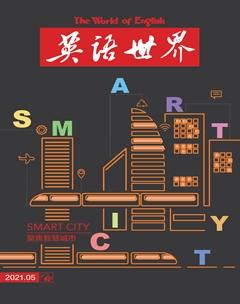What Does a Smart City Look Like? 智慧城市什么樣?
卡亞·伊斯梅爾
Humans are flocking to cities, and cities are rapidly evolving—not just to accommodate more people, but to help them flourish.
With the UN forecasting that 68% of the worlds population will live in urban areas by 2050, an increasing number of cities are turning to Internet of Things (IoT) technologies to make their streets, trains, taxis and government services “smarter” to improve efficiency and quality of life.
But what exactly does a smart city look like, and are there any good examples already leading the way?
What exactly is a smart city?
A smart city refers to a metropolitan or cosmopolitan city that utilizes IoT technology to effectively manage the citys assets and resources which include sustainable energy, transportation, waste management and more. The main objective of using this technology is to improve the quality of life of the citys citizens from an economic, social and environmental level.
Kenta Yasukawa, co-founder and CTO of Soracom1, said any city that collects and analyzes data can be considered a smart city. “In practice, cities around the world are using connected sensors and big data analytics to improve life for residents and visitors across areas of governance ranging from traffic and transportation to power and water delivery, waste management, municipal services and law enforcement,” said Yasukawa.
As for the characteristics that define a smart city, Yasukawa shared that each smart city will have their own unique objective, but they all acknowledge the importance of IoT technology. “Some [smart cities] focus on innovation, others on infrastructure or overall efficiency. What they share in common is an understanding that emerging IoT and cloud capabilities offer a meaningful opportunity to better understand the intimate2 workings of an urban center. … and ultimately better serve its population while reducing both cost and waste.”
How can cities become smart?
Chris Wiegand, CEO and co-founder of Jibestream3, shared that the key for a city to become smart lies in how it can leverage4 both IoT technology and location-awareness. “By using sensors to process data and facilitate edge computing, they are able to manage infrastructure and resource allocation efficiently, resulting in a removal of friction from daily interactions and experiences for both municipal employees and city residents,” said Wiegand. He went on to explain that to make any space smart, “It is crucial to have a digitized representation of the city that is geospatially accurate at both street level and at the underground level, with indoor maps of subway paths and concourses and large public buildings.” This visual context of the city makes it easier to interpret the data provided by the IoT technology.
Wiegand also mentioned that you need to have the “requisite connectivity for devices and sensors to function properly.”
When asked whether any city can become smart, Wiegand said, “Any city can become a smart city, regardless of size, as long as it lays the key supporting infrastructure and has the commitment of citizens, municipal officials and local government and collaboration between public and private companies with the different levels of government.”
Examples of smart cities
To give you an idea of what a smart city looks like, we have identified the following “smart” cities:
Singapore—When Singapore rolled out its Smart Nation program5, the city embraced new technologies in every aspect of its infrastructure and operations. And in doing so, the city became a leading example for energy-efficient street lighting, which is responsive to weather changes. “The city of Singapore is arguably already the smartest city in the world, with the minute workings of the city rendered in data down to the backyard shortcuts children take on their way home from school,” said Wiegand.
Barcelona, Spain—In 2017, the city of Barcelona rolled out a mandate to “rethink the smart city from the ground up. ” Barcelona has, for time, been using IoT and cutting edge digital devices to municipal operations, but with the 2017 mandate there is now an emphasis to introduce a shift from “technology-first” to “citizen-first.”
“Barcelona expanded its smart applications and implemented open stand-ards-based platforms that integrate data from thousands of IoT devices that previously did not communicate with each other. Through reforming the citys network to become more adaptable and connected, Barcelona is considered one of the leading examples of smart cities,” said Daniele Loffreda, market development advisor and consultant for Ciena6.
Songdo, South Korea—Deborah Andrade, communication specialist at SlicingDice7, said Songdo in South Korea is considered to be a “world reference” for a smart city. “Songdo has Smart Work centers with teleconferencing systems that allow a third of its government staff to work closer to their homes that are equipped with Wi-Fi and sensor networks,” said Andrade.
Andrade added that Songdo was the first city to implement the Online Electric Vehicle Technology8 (OLEV) transportation system, which utilizes magnetic fields to generate electricity for buses.
“[Songdo] has an innovative IoT Cube9s lab, where different technology companies obtain real-time data from Songdos citizens and work together towards bringing better solutions and smart innovations for them,” said Andrade.? ? ?■
人們正涌向城市,城市也在迅速發展——不僅僅是為了容納更多的人,也是為了讓人們富足。
聯合國預測,到2050年,世界上生活在城市地區的人口將達到68%,越來越多的城市開始使用物聯網技術,從而使它們的街道、火車、出租車和政府服務“更有智慧”,以提高效率,改善生活質量。
但是,智慧城市到底是什么樣子的呢?是否已經有一些成功范例了呢?
智慧城市到底是什么?
智慧城市是指利用物聯網技術對城市資產和資源,包括可持續能源、交通、垃圾管理等,進行有效管理的大都市或國際大都市。使用這項技術的主要目的是從經濟、社會和環境層面提高城市居民的生活質量。
Soracom聯合創始人兼首席技術官安川健太表示,任何收集和分析數據的城市都可以被視為智慧城市。他說:“實際上,世界各地的城市都在使用互聯的傳感器和大數據分析來改善居民和訪客的生活,涉及從交通運輸到供電供水、垃圾管理、市政服務和執法等各個治理領域。”
至于用哪些特征來界定智慧城市,安川認為,每個智慧城市都有自己獨特的目標,但所有城市都認可物聯網技術的重要性。“一些(智慧城市)注重創新,另一些城市注重基礎設施或整體效率。它們的共同之處在于,明白新興的物聯網和云端能力提供了一個重要的機會,讓我們更好地了解城市中心的各種運作細節……最終在減少成本和損耗的同時更好地服務于居民。”
城市如何變得有智慧?
Jibestream的首席執行官兼聯合創始人克里斯·威甘德認為,要使城市變得有智慧,關鍵在于如何利用物聯網技術和位置感知。威甘德說:“通過使用傳感器來進行數據處理和協助邊緣計算,能夠有效地管理基礎設施和資源分配,使市政雇員和市民在日常交流和處理事務時都更順暢。”他接著解釋說,為了實現空間的智慧化,“關鍵是要有一個數字城市模型,準確呈現地面街道和地下網絡的地理空間,有地鐵路線、車站大廳和大型公共建筑的室內地圖。”這種城市的可視情境使人們更容易解讀物聯網技術提供的數據。
威甘德還提到,你得有“設備和傳感器正常工作所必需的連通性”。
當被問及是否任何城市都可以變得有智慧時,威甘德說:“任何城市,無論規模大小,都能發展成為智慧城市,只要搭建了關鍵性的配套基礎設施,市民、市政官員和當地政府都傾力支持,公私企業與各級政府也協同合作”。
智慧城市范例
為了讓你了解智慧城市,我們舉以下“智慧”城市為例:
· 新加坡——當新加坡推出“智慧國家”計劃時,在其基礎設施和運營的各個方面都采用了新技術。通過這種做法,這座城市成為了節能型路燈的先進典范,這種路燈可感應天氣變化,并隨之調節照明亮度。威甘德說:“新加坡可以說已經是世界上最智慧的城市了,這座城市的細微運作情況皆由數據體現,數據的采集甚至覆蓋到了孩子們放學回家從后院抄的近路。”
· 西班牙巴塞羅那——2017年,巴塞羅那市頒布了一項政令,“從頭開始重新思考智慧城市”。巴塞羅那一度在市政運營中使用物聯網和尖端的數字設備,但要完成這項政令,現在的工作重心要從“技術為本”轉變到“市民為本”。
“巴塞羅那擴展了它的智慧型應用,并實現了基于標準的開放式平臺,整合了來自數千個以前互不相通的物聯網設備的數據。通過改造城市網絡,巴塞羅那更具適應性和互聯性,被視作智慧城市的一個領先范例。”Ciena市場開發顧問丹尼爾·洛弗雷達說。
· 韓國松島——SlicingDice的通信專家黛博拉·安德拉德表示,韓國松島被視為智慧城市的“世界參考”。“松島擁有若干配備電話會議系統的‘智慧工作中心。在家里配備Wi-Fi和傳感器網絡,三分之一的政府工作人員便可以在離家更近的地方工作。”安德拉德說。
安德拉德補充說,松島是第一個實現在線電動汽車技術交通系統的城市,該系統利用磁場為公交車發電。
安德拉德說:“(松島)有一個創新型IoT Cube實驗室,各家科技公司從那里獲取松島市民的實時數據,并共同努力為他們帶來更好的解決方案和智慧創新。” ? ? □
(譯者單位:福建省科技館)
1一家移動虛擬網絡運營商,與日本最大的電信公司NTT Docomo在3G及LTE業務方面展開合作,主要為IoT提供網絡與電信基礎設施建設服務。? 2 intimate詳細的。? 3一種地圖繪制解決方案,通過將業務數據與室內地圖集成,為企業組織提供將智能添加到室內空間的工具。
4 leverage利用,應用。
5新加坡政府于2014年公布了“智慧國家2025”的10年計劃(“智能城市2015”計劃的升級版),致力于打造“智慧國”,建設覆蓋全島數據收集、連接和分析的基礎設施和操作系統,以提供更好的公共服務。
6光纖通信設備制造商,總部位于美國馬里蘭州 。? 7一家大數據初創公司,提供基于云的全方位服務數據倉庫和分析式數據庫即服務。? 8這一技術允許電動公交車在路面上行駛時進行充電,即在道路中埋設線圈產生電磁波,通過安裝在車輛下的裝置將磁場能轉化成電能。? 9 IoT Cube公司的創新中心與應用開發者、大學和初創企業合作,測試和研發醫療、交通和制造業創新型解決方案。

